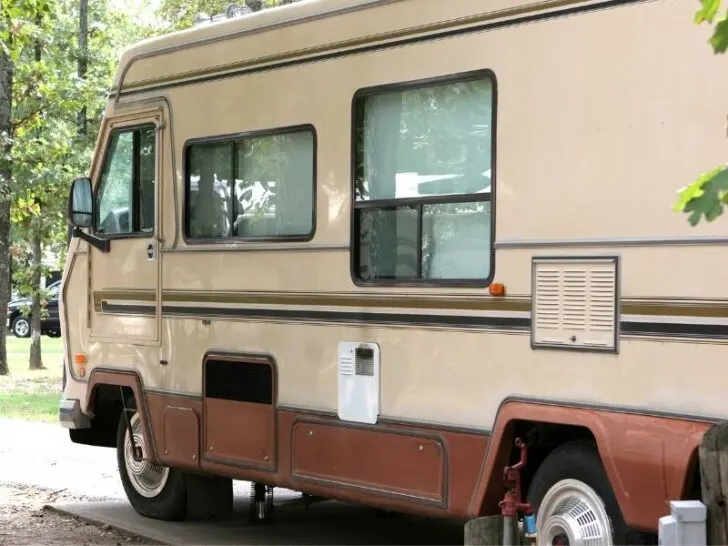Increased humidity in RV causes mold, mildews, and dust to accumulate beneath its carpets and furniture.
Why is My RV So Humid? In general, Your RV becomes so humid due to temperature variations between the inside and the outside environment. The humidity builds in RV due to faulty ventilation systems, propane heaters, and oversaturation of the desiccants. The moisture content in the vehicle also increases due to indoor cooking, bathing, and drying of clothes.
It is necessary to overcome these factors that increase humidity because they have a bad and uncomfortable impact on their living conditions.
Why is My RV So Humid?
I have added 20 main reasons that make the RV humid and their solution to reduce the moisture.
Cold conditions
The inside of the RV is colder than the outside temperature. These fluctuations in the outer and inner environment increase the humidity levels.
When the hot air from outside comes in contact with the cold windows, it can cause condensation. The drops of water appear on the glass windows and build up moisture.
It is harmful to the vehicle; it can damage its parts. In addition, the long-term exposure will destroy the whole RV structure.
To prevent this situation, clean the windows with a dry cloth whenever water droplets come on them.
You can also use moisture absorbents to fix this issue.
Due to fog
The cold environment on the outside and the warmer inside make fog on windows.
Due to cold, the air converts its water vapors to liquid form. Therefore, it can cause the formation of fog in the windows and doors.
Fog appears on the window if the seal of the glass window is damaged and cracked.
The mixing of the fantastic and warm air leads to the formation of fog on the glass. The mists on the front glass also cause difficulty in driving and may cause road accidents.
To avoid the formation of fog, slightly open its windows so air will cross from them.
The better crossing of air decreases the risk of fog, and ultimately it reduces the moisture content.
Humidity due to cooking inside RV
RV kitchens are tiny; they can produce more moisture in them. In addition, these kitchens are not equipped with exhaust fans.
When people cook their favorite dish in the kitchen, the water vapors evaporate from them, and this steam increases the humidity level. Likewise, the heating of food evaporates water from them.
The boiling of water in cattle also releases water vapors and produces damping in the vehicle.
Due to the congested area, the steam accumulated in the kitchen also damages the cabinets.
To prevent the moisture due to cooking, cook food outside in the open air.
Cover the cooking utensils adequately so heat will not evaporate from them.
Do not use kettles and avoid boiling in the kitchens. Instead, use an extractor fan in the kitchens while cooking to remove extra moisture.
Wet clothes increase humidity
Your cloth becomes wet during the trip, and you place them inside RV. Wet clothes reside more water in them, and evaporating water vapors subsequently increases the humidity.
Wet clothes speed up the process of condensation in your camper. The placement of damp cloth increase the moisture level 20 to 40 % more in the RV.
These environmental conditions are good for molds to grow and cause a smell in the damp cloths.
Due to smell, it can cause difficulty for you to stay there.
Always dry clothes outside so moisture evaporate in the open air. If you place them in RV, open the doors or windows after removing damp air. For a better crossing or exchange of air, turn on the fan to reduce the moisture.
Excessive use of bathrooms
Mostly these vehicles have a short living space, and it has a congested area for bathrooms. So the water always stays in them and makes the environment moist.
Taking a bath with warm water produces more steam, and it can eventually damage your vehicle.
The water vapors remain inside if the RV bathrooms are not properly equipped with vents.
The presence of water in the bathrooms causes fungus to grow there and make them slippery.
I always use exhaust fans in the bathrooms to prevent this issue.
After taking a shower, open the doors and windows of the vehicle so moist air can move outside.
Damaged RV roof
The cracked roofs of the RV can cause moisture to enter them. Therefore, when you travel in an area where environmental conditions are moist, they ultimately increase the moisture content.
More humidity from the air enters them due to cracks in the roof.
To prevent this before traveling, check the roof of your vehicle. Its roof must be made up of high material not to crack easily and moistures enter them.
Always paint your roof to prevent such conditions.
Moist air
When you keep open the doors and windows in moist areas, the air gets to enter your RV.
It is difficult and uncomfortable to live in a damp environment during winters.
You cannot sit well and sleep well if there is too much moisture inside during cold days.
It would help if you closed the windows and doors when you are passing through these areas. Also, put the curtains on the windows, so they absorb extra moisture from the air.
Absence of air conditioners
Air conditioners are beneficial to use on hot sunny days in your RV. They lower the temperature to prevent heat, but it eventually increases the humidity as the temperature gets low.
When you do not adequately clean the air conditioner’s coils placed in your RV, this also indirectly raises the moisture content.
To decrease them, use a dehumidifier, and you can also use bags of activated charcoal to fix the issue.
You should clean the AC pipes to improve cross ventilation inside the vehicle.
Poor ventilation
If there is no proper ventilation system in your RV, then water vapors from the dry cloth, cooking, and bathroom showers remain in them.
The internal environment will become moist if there are no fans or windows.
Open the RV doors for proper ventilation to decrease the amount of moisture.
You can determine the location for exhaust installation for their proper cross of the moist air outside.
Absence of insulated windows
The insulation sheets are crucial to use it can reduce the moisture coming from windows. It reduced the content of water in the RV that is coming from the outside environment.
Water vapors do not form on the glass surface once these insulation sheets are installed.
Use insulation sheets on the windows to protect from dew drops. It can also maintain the temperature variations inside and outside of the RV.
More people living in a small RV
When you breathe in the RV, they are closed systems, so water volume from your breaths remains there.
So it is better to turn on the ventilation to prevent humidity due to sweating, turn on the air conditioner. It can decrease the moisture level and open its box on the roof, so proper air comes inside the trailer.
Closed cabinet doors
The moisture primarily resides more in closed cabinets. Once its cabinets are closed, it will prevent the entry of dry air.
It is not easy to clean the mold and dirt that is present in these cabinets.
If the mold species and dirt grow there, it isn’t easy to clean them from cabinets.
Open the cabinets and make a proper ventilation system there so you can make the environment less damp.
You can also place silica gel so it can readily absorb the extra moisture content.
Stay near ocean or coastal areas
Coastal areas have more humidity due to their environmental condition.
Coastal areas make RV more humid because due to the sun’s heat, the water vapors evaporated from them. As a result, the air directly absorbs more moisture from these vapors and becomes moist.
Do not open the windows in these areas when air blows there in speed because the air can enter inside your vehicle.
Only open those windows from where directly sunshine enters your vehicle to absorbs the moisture.
RV propane furnace
Propane in RVs help to heat the furnace and uses the electricity to run the fan.
When you start them to heat the propane, the water vapors condensed on the glass; therefore, they can cause moisture formation.
Use RV vents to lessen the humidity from them. You can also use electric or ceramic heaters instead of propane because they will not make the RV moist.
The electric heaters are also cheaper than propane heaters and provide better heat.
Cloudy and rainy weather outside
The clouds are water vapors of cool air cloudy outside also increases the relative humidity in the RV. Then, finally, the dry and moist air enters the RV.
The ideal humidity level in RV must be from 60 to 70% to reduce the growth of molds there. Clouds outside also cause foggy windows, and these dewdrops increase the moisture.
Properly check the ceiling of the RV that it is not leaking. Also, check the windows that are correctly sealed.
Oversaturation of desiccants
The RV has double glass pane windows, and desiccants are present between them like a sandwich.
These desiccants are made of different chemicals that will absorb the moisture and reduces the humidity.
When these desiccants get oversaturated, they cannot absorb more moisture. This moisture then collects in the glass and makes them foggy.
These foggy glass windows increase the level of humidity. Before traveling in RV, always check the desiccant in between glass windows.
Use electric heaters and blow dryers to warm up them.
Metal doors and windows
Some places are the best place for moisture accumulation; these include metal doors, windows, and locks. During cooking, bathing, breathing, and sweating, more moisture content collects on these materials.
If the humidity is more on the metal surfaces, it can cause rusting and corrosion of doors and windows. The corrosive doors and windows also get damaged easily.
Use material other than metal for the installation of doors and windows of RV. Use machines that remove moisture, and you can also use absorbents.
Extra distilled water in RV battery
We add distilled or deionized water to the battery to dilute the acid in them. The use of distilled water also increases the durability of the battery.
When you overfill the batter with this water, it may seep out of the battery, and the air from the ceiling vents can absorb this water.
I always check the levels of water in my battery before traveling.
Damaged RV vinyl coating
Its floors are mostly made of vinyl material; they are better absorbents of moisture. If the vinyl coating is damaged, it can cause more humidity.
Suppose your floor is not coated with vinyl and made up of some other material, then it cannot absorb the moisture.
You should check the RV floor if they are made of some other material, then coat them with vinyl to better absorb moisture in them.
It would help if you repaired them in case of any damage to the vinyl floor coating.
Absence of graphite locks
If you use metal locks, it will cause more moisture in the RV. It is better to use graphite; it will absorb the extra water present inside them.
Always use graphite locks to decrease water and humidity.
Also, check that your exhaust fans are working correctly and have more airflow in them.
Related Articles:
Is it easy to replace RV door window frame?
Can you install an RV door latch on a cargo trailer?
Can you unclog the RV kitchen sink?
Where should I install a digital thermostat in the RV?

